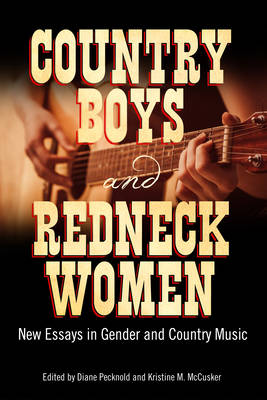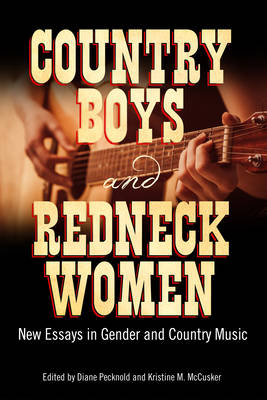
- Afhalen na 1 uur in een winkel met voorraad
- Gratis thuislevering in België vanaf € 30
- Ruim aanbod met 7 miljoen producten
- Afhalen na 1 uur in een winkel met voorraad
- Gratis thuislevering in België vanaf € 30
- Ruim aanbod met 7 miljoen producten
Zoeken
Country Boys and Redneck Women
New Essays in Gender and Country Music
€ 186,95
+ 373 punten
Omschrijving
Essays that overthrow stereotypes and demonstrate the genre's power and mystique Contributions by Georgia Christgau, Alexander S. Dent, Leigh H. Edwards, Caroline Gnagy, Kate Heidemann, Nadine Hubbs, Jocelyn Neal, Åse Ottosson, Travis Stimeling, Matthew D. Sutton, and Chris Wilson Country music boasts a long tradition of rich, contradictory gender dynamics, creating a world where Kitty Wells could play the demure housewife and the honky-tonk angel simultaneously, Dolly Parton could move from traditionalist "girl singer" to outspoken trans rights advocate, and current radio playlists can alternate between the reckless masculinity of bro-country and the adolescent girlishness of Taylor Swift. In this follow-up volume to A Boy Named Sue, some of the leading authors in the field of country music studies reexamine the place of gender in country music, considering the ways country artists and listeners have negotiated gender and sexuality through their music and how gender has shaped the way that music is made and heard. In addition to shedding new light on such legends as Wells, Parton, Loretta Lynn, and Charley Pride, it traces more recent shifts in gender politics through the performances of such contemporary luminaries as Swift, Gretchen Wilson, and Blake Shelton. The book also explores the intersections of gender, race, class, and nationality in a host of less expected contexts, including the prisons of WWII-era Texas, where the members of the Goree All-Girl String Band became the unlikeliest of radio stars; the studios and offices of Plantation Records, where Jeannie C. Riley and Linda Martell challenged the social hierarchies of a changing South in the 1960s; and the burgeoning cities of present-day Brazil, where "college country" has become one way of negotiating masculinity in an age of economic and social instability. Diane Pecknold, Louisville, Kentucky, is an associate professor of women's and gender studies at the University of Louisville. Kristine M. McCusker, Murfreesboro, Tennessee, is a professor of history at Middle Tennessee State University. Together they edited A Boy Named Sue: Gender and Country Music (University Press of Mississippi).
Specificaties
Betrokkenen
- Uitgeverij:
Inhoud
- Aantal bladzijden:
- 304
- Taal:
- Engels
- Reeks:
Eigenschappen
- Productcode (EAN):
- 9781496804914
- Verschijningsdatum:
- 1/02/2016
- Uitvoering:
- Hardcover
- Formaat:
- Genaaid
- Afmetingen:
- 156 mm x 234 mm
- Gewicht:
- 644 g

Alleen bij Standaard Boekhandel
+ 373 punten op je klantenkaart van Standaard Boekhandel
Beoordelingen
We publiceren alleen reviews die voldoen aan de voorwaarden voor reviews. Bekijk onze voorwaarden voor reviews.







